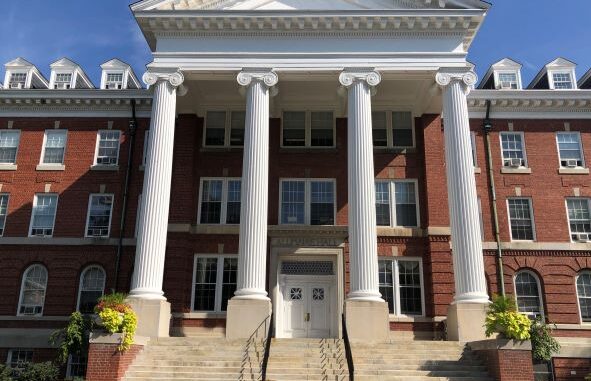
By Rachel Sell
Three new models have been proposed to reform the core curriculum at Hood.
These models include the Heart, Mind, and Hands model, which is linked to Hood’s values and, as the name suggests, intends to prepare students to lead in the real world with their heart, mind and hands; the You and Hood model, which focuses on the four Hood pillars of Hope, Opportunity, Obligation and Democracy; and the Learning Community model.
According to Dean of Faculty Paige Eager, the ideas for the new curriculum try to stay authentic to Hood College’s identity. “What you don’t want to do with gen ed reform is copy-paste what other institutions have done,” Eager said. “You can get ideas, but don’t…hope it will work at your own college.”
Eager said that for students currently at Hood, the change will not be immediate. The core curriculum will not be transformed by next fall or even the fall semester of 2024.
“We might pilot some different things, but it’s not going to be any kind of wholesale changes,” Eager said. “Even if we do revise it and roll it out, it’s a staggered process.”
The implementation of a new core curriculum would require a gradual phaseout, which would take about five or six years. “You have to honor the students that are maybe, say sophomores, and… give them the choice to stay under the old core or transition to the new core,” Eager said. “Most students at that point in their academic journey would probably stay under the old one.”
Eager said that the Core Revision Group, which is leading the reforms, still wants to allow students to explore different categories of classes. However, there are some learning outcomes that colleges want students to achieve out of the core curriculum, as well as things that must be done because they are state requirements.
The revisions, according to Eager, will tie more closely to Hood’s mission and values. In addition, the curriculum will integrate more high-impact practices into the core curriculum, such as internships, service learning, capstone projects, undergraduate research and study abroad opportunities.
“Research has shown us that these help students with retention and… completing their college degree,” Eager said.
When it comes to curriculum changes, there is often debate among faculty, according to Eager.
Hood has carried many classes in the core curriculum based on tradition, such as the global language requirement, yet faculty have long deliberated about American Sign Language classes’ inability to fulfill the requirement. In addition, some have argued that the health and wellness requirement could take a more holistic approach, and be satisfied by more than just P.E. classes.
According to Eager, the process of revising the core curriculum is a lengthy one with many moving parts. “It’s truly a whole-campus endeavor,” Eager said. “We have to work with the registrar’s office, faculty, enrollment management…we’ve interviewed every academic department about it.”
The process, said Eager, must be thoughtful and methodical at every different step. The Core Revision Group has met with the SGA, the Academic Affairs Committee, and students from many programs.
“We want everyone who wants to have a voice to feel like they do,” Eager said. “We did… surveys with staff and alumni…getting student input about what they’d like to see change.”




Be the first to comment